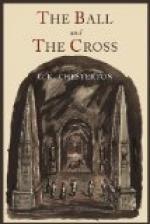“Why, you great fool!” cried MacIan, rising to the top of his tremendous stature, “did you think I would have doubted only for that rap with a sword? I know that noble orders have bad knights, that good knights have bad tempers, that the Church has rough priests and coarse cardinals; I have known it ever since I was born. You fool! you had only to say, ‘Yes, it is rather a shame,’ and I should have forgotten the affair. But I saw on your mouth the twitch of your infernal sophistry; I knew that something was wrong with you and your cathedrals. Something is wrong; everything is wrong. You are not an angel. That is not a church. It is not the rightful king who has come home.”
“That is unfortunate,” said the other, in a quiet but hard voice, “because you are going to see his Majesty.”
“No,” said MacIan, “I am going to jump over the side.”
“Do you desire death?”
“No,” said Evan, quite composedly, “I desire a miracle.”
“From whom do you ask it? To whom do you appeal?” said his companion, sternly. “You have betrayed the king, renounced his cross on the cathedral, and insulted an archangel.”
“I appeal to God,” said Evan, and sprang up and stood upon the edge of the swaying ship.
The being in the prow turned slowly round; he looked at Evan with eyes which were like two suns, and put his hand to his mouth just too late to hide an awful smile.
“And how do you know,” he said, “how do you know that I am not God?”
MacIan screamed. “Ah!” he cried. “Now I know who you really are. You are not God. You are not one of God’s angels. But you were once.”
The being’s hand dropped from his mouth and Evan dropped out of the car.
XVI. THE DREAM OF TURNBULL
Turnbull was walking rather rampantly up and down the garden on a gusty evening chewing his cigar and in that mood when every man suppresses an instinct to spit. He was not, as a rule, a man much acquainted with moods; and the storms and sunbursts of MacIan’s soul passed before him as an impressive but unmeaning panorama, like the anarchy of Highland scenery. Turnbull was one of those men in whom a continuous appetite and industry of the intellect leave the emotions very simple and steady. His heart was in the right place; but he was quite content to leave it there. It was his head that was his hobby. His mornings and evenings were marked not by impulses or thirsty desires, not by hope or by heart-break; they were filled with the fallacies he had detected, the problems he had made plain, the adverse theories he had wrestled with and thrown, the grand generalizations he had justified. But even the cheerful inner life of a logician may be upset by a lunatic asylum, to say nothing of whiffs of memory from a lady in Jersey, and the little red-bearded man on this windy evening was in a dangerous frame of mind.




